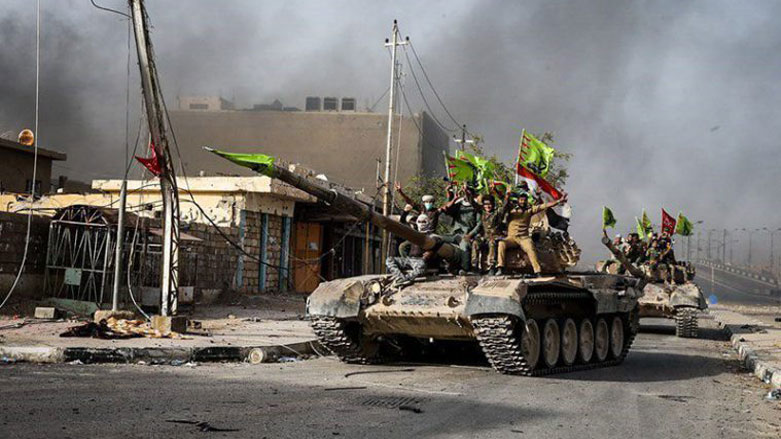US confirms Hashd al-Shaabi, Peshmerga, SDF gains

WASHINGTON, United States (Kurdistan24) - The Hashd al-Shaabi forces have succeeded in cutting the main road from Mosul to Syria; the US has officially confirmed. The Shiite militias, thus, have deprived the Islamic State (IS) of the ability to resupply fighters from Syria or retreat there from Mosul.
Moreover, Peshmerga forces, backed by US airstrikes and accompanied by US Special Forces, have succeeded in gaining control of Bashiqa. The liberation of the town, which lies 12 kilometers northeast of Mosul, follows a two-week siege.
On Thursday, Pentagon spokesman, Peter Cook, confirmed the success of both forces in the anti-IS campaign. Kurds know well of the advances of the Peshmerga, and Western journalists are embedded with them, so those claims were never in doubt.
However, Cook’s statement was the first independent and reliable confirmation of the Hashd al-Shaabi's assertion that they had, indeed, cut off IS’ freedom of movement west of Mosul.
Moscow, Tehran, and Hizbollah had all earlier charged that the US plan for the liberation of Mosul included leaving IS fighters an escape route that would allow them to flee to Syria and join the fight there against the Assad regime.
That claim has now been proven false, but it followed a line of propaganda long promoted by Tehran and subsequently adopted by Moscow: Washington was colluding with IS. Baghdad did little to refute that view, and this reporter was astonished in 2013 when an Iraqi ambassador repeatedly asserted that the US supported IS.
The Hashd al-Shaabi was keen to participate in the Mosul operation. Given the widespread concern that they might carry out revenge attacks in the Sunni city, employing them as a blocking force in the west world seem to reflect creative operational planning
Cook also confirmed that Peshmerga forces had retaken Bashiqa from IS “although some back clearing still continues,” while he described the Peshmerga role as “critical” in the liberation of Mosul.
He also spoke about the advances that the Kurdish-dominated Syrian Democratic Forces (SDF) have made against IS in Syria. The SDF continue their drive toward Raqqa, he said, and “continue to make progress” against what he characterized as “moderate” IS resistance.
The Pentagon spokesman provided some insights into the US relationship with the SDF, a particularly sensitive topic, given the strong Turkish objections to American cooperation with the organization.
He affirmed that US commanders had “the ability to communicate with the leadership of the SDF.”
He also said that “some number” of US Special Forces were operating with the SDF, and it was through them that US commanders in Baghdad received “feedback” on SDF actions.
As for fighting IS inside the city of Mosul, that task is falling to the Iraqi army. When asked about news stories that the initial fighting was proving difficult and “not going as well” as hoped, Cook denied that was so.
However, subsequent reports have made clear that IS is fighting hard for Mosul, using extremely brutal tactics. Even Iraq’s elite counter-terrorism force is facing problems, and doubts are growing as to whether the battle for Mosul will be completed by year’s end, as Iraq’s Prime Minister had once vowed.
Indeed, when Kurdistan24 asked Cook whether he expected Mosul to be liberated under President Obama or whether it would fall to President Trump to complete the task, he responded, “We’re not going to predict timelines.”
Editing by Delovan Barwari
